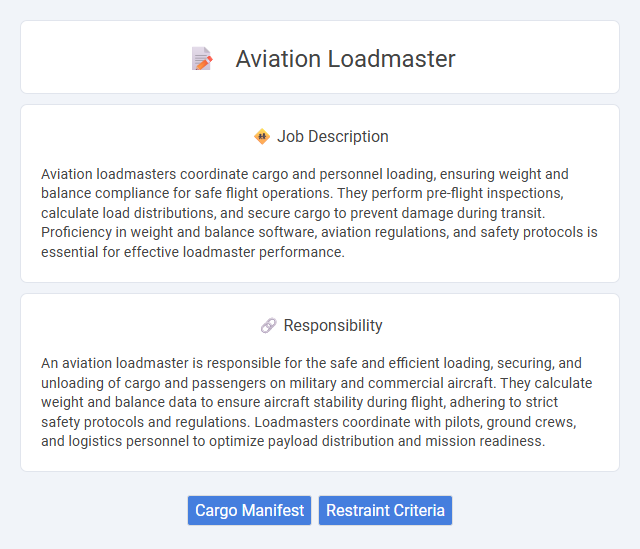
Aviation loadmasters coordinate cargo and personnel loading, ensuring weight and balance compliance for safe flight operations. They perform pre-flight inspections, calculate load distributions, and secure cargo to prevent damage during transit. Proficiency in weight and balance software, aviation regulations, and safety protocols is essential for effective loadmaster performance.
Individuals with strong physical stamina and the ability to handle high-pressure situations are likely to be well-suited for an aviation loadmaster role. Those who thrive in organized, detail-oriented environments and possess good communication skills may have a higher probability of adapting successfully to the job's demands. However, people who prefer low-stress roles or have difficulty maintaining focus during long hours might find this career challenging.
Qualification
Aviation loadmasters must possess specialized training in weight and balance calculations, cargo securing techniques, and emergency procedures to ensure safe and efficient aircraft operations. Qualifications typically include military or civilian certifications, proficiency in aircraft type-specific loading protocols, and strong physical fitness to handle demanding tasks. Experience with logistical coordination and adherence to strict safety standards is essential for operational success in various flight environments.
Responsibility
An aviation loadmaster is responsible for the safe and efficient loading, securing, and unloading of cargo and passengers on military and commercial aircraft. They calculate weight and balance data to ensure aircraft stability during flight, adhering to strict safety protocols and regulations. Loadmasters coordinate with pilots, ground crews, and logistics personnel to optimize payload distribution and mission readiness.
Benefit
The aviation loadmaster job likely provides substantial benefits such as competitive salaries, comprehensive health insurance, and retirement plans due to the demanding nature of the role. Employees may also enjoy opportunities for travel, skill development, and career advancement in military or civilian aviation sectors. These benefits potentially contribute to job satisfaction and long-term career stability.
Challenge
The role of an aviation loadmaster likely presents significant challenges due to the precise calculations required for weight distribution and aircraft balance, which are critical for safe flight operations. It may be demanding to coordinate cargo loading and unloading under tight schedules while ensuring compliance with safety regulations. The job probably involves high-pressure situations where quick decision-making and exceptional attention to detail are essential to prevent potential hazards during flight.
Career Advancement
Aviation loadmasters play a crucial role in aircraft weight distribution, cargo securing, and passenger safety, making their expertise indispensable in military and commercial aviation sectors. Career advancement opportunities include progressing to senior loadmaster roles, specializing in hazardous materials handling, or transitioning into flight operations management and logistics coordination. Advanced certifications and experience in various aircraft types significantly enhance prospects for leadership positions within aviation maintenance and operational planning teams.
Key Terms
Cargo Manifest
Aviation loadmasters specialize in managing cargo manifests to ensure accurate documentation of all items aboard aircrafts. They coordinate weight, balance, and secure cargo according to safety regulations, optimizing flight performance and compliance. Precise cargo manifest management is critical for mission success and safety in military and commercial aviation operations.
Restraint Criteria
Aviation loadmasters ensure cargo and passengers comply with strict aircraft restraint criteria to maintain flight safety and stability. They calculate weight distribution, secure loads using tie-down straps and nets, and verify that cargo restraints meet regulatory standards. Precise adherence to restraint criteria prevents load shift during flight, reducing risk of accidents or structural damage.
 kuljobs.com
kuljobs.com